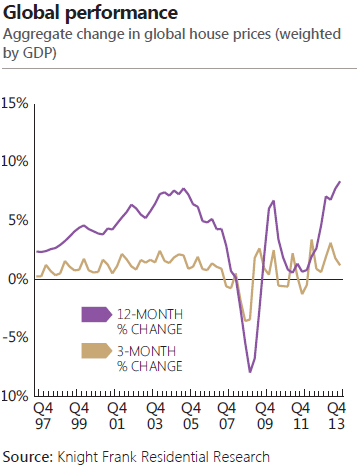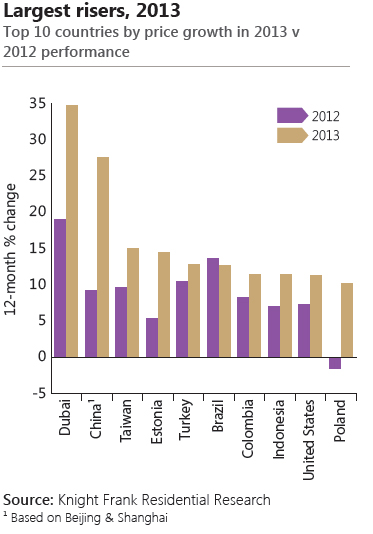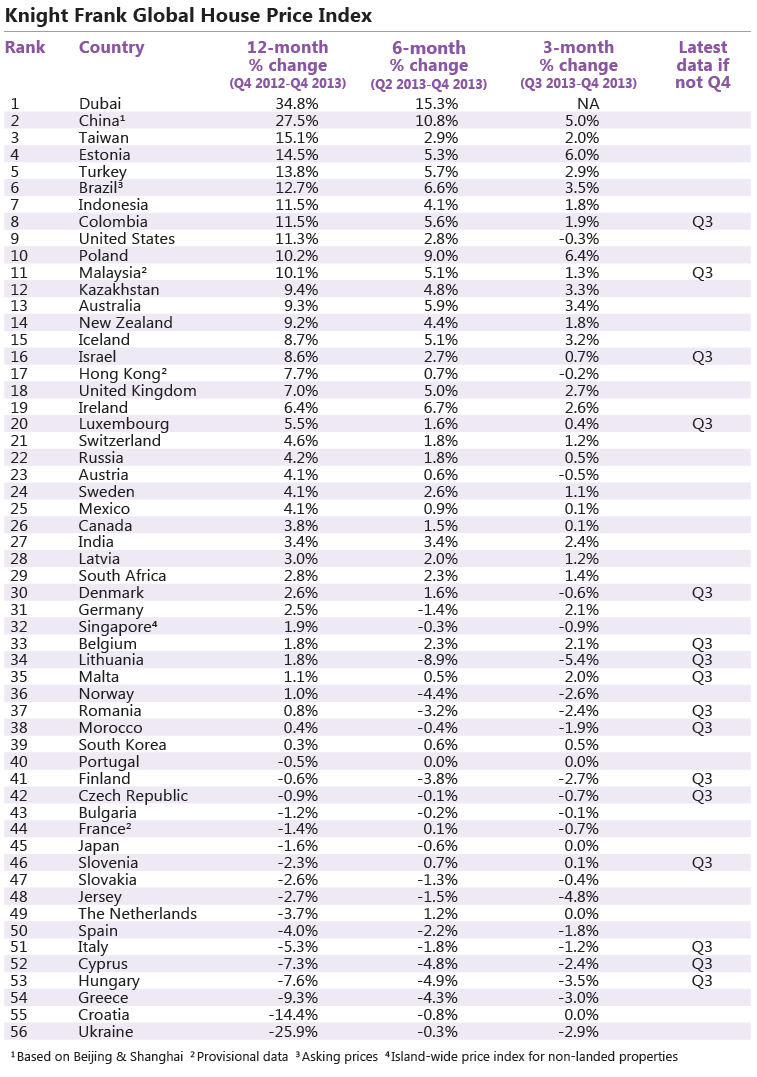The WPJ
THE WORLD PROPERTY JOURNALReal Estate Facts Not Fiction
Residential Real Estate News

Record Global Home Price Growth in 2013
Residential News » Asia Pacific Residential News Edition | By Francys Vallecillo | March 14, 2014 9:47 AM ET
Global home prices experienced record growth in 2013, mirroring the upturn in the global economy.
The Global House Price Index released by property research firm Knight Frank increased by 8.4 percent last year, compared to 4.6 percent in 2012, representing the largest index increase since 1995.
 Mainstream home prices increased by the greatest margin in the markets of Dubai, China and Taiwan, where prices grew by 35 percent, 28 percent and 15 percent, respectively.
Mainstream home prices increased by the greatest margin in the markets of Dubai, China and Taiwan, where prices grew by 35 percent, 28 percent and 15 percent, respectively. Dubai's property market is recovering after having fallen dramatically during the collapse. However, it still has room for further growth.
"Despite Dubai's stand out performance in 2013, mainstream prices remain 25 percent below their 2008 peak," Kate Everett-Allen, Knight Frank International Residential Research, said in the report.
The improving job market and the continuation of low interest rates in Europe and the U.S. are fueling buyer confidence, the report shows.
Thirty nine countries recorded positive annual price growth last year, compared with 27 countries in 2012.
In 2013, emerging markets floundered economically, but managed to record strong home price performance. Turkey, Brazil, Indonesia and Colombia rank in the top ten for annual price growth, with each market recording double-digit growth.
 The lower end of the home price growth spectrum is dominated by Europe. However, the rate of price decline is slowing in countries such as Spain, France and the Netherlands, Knight Frank reports.
The lower end of the home price growth spectrum is dominated by Europe. However, the rate of price decline is slowing in countries such as Spain, France and the Netherlands, Knight Frank reports. The weakest markets in 2013 were Ukraine, Croatia and Greece, ending the year with home prices 26 percent, 14 percent and 9 percent lower respectively due to political tension and economic stagnation.
The new report highlights the recovery of the most embattled global housing markets. Prices in Ireland, one of the hardest hit during the down turn, have rebounded, with the market now listed at 19th on the home price growth index, higher than Germany, Austria and Switzerland.
"Prices in Ireland, the U.S., and the U.K. rebounded in 2013," the report states. "The speed with which stimulus measures are withdrawn (QE tapering), the ramping up, or down, of cooling measures in Asia and the repercussions of the political crisis in the Ukraine are likely to be the key determinants of the index results during the remainder of 2014."

Sign Up Free | The WPJ Weekly Newsletter
Relevant real estate news.
Actionable market intelligence.
Right to your inbox every week.
Real Estate Listings Showcase
Related News Stories
Residential Real Estate Headlines
- More Americans Opting for Renting Over Homeownership in 2024
- BLOCKTITLE Global Property Tokenization Platform Announced
- Small Investors Quietly Reshaping the U.S. Housing Market in Late 2024
- Greater Miami Overall Residential Sales Dip 9 Percent in November
- U.S. Home Sales Enjoy Largest Annual Increase in 3 Years Post Presidential Election
- U.S. Housing Industry Reacts to the Federal Reserve's Late 2024 Rate Cut
- U.S. Home Builders Express Optimism for 2025
- Older Americans More Likely to Buy Disaster-Prone Homes
- NAR's 10 Top U.S. Housing Markets for 2025 Revealed
- U.S. Mortgage Delinquencies Continue to Rise in September
- U.S. Mortgage Rates Tick Down in Early December
- Post Trump Election, U.S. Homebuyer Sentiment Hits 3-Year High in November
- Global Listings Aims to Become the Future 'Amazon of Real Estate' Shopping Platform
- Greater Las Vegas Home Sales Jump 15 Percent in November
- Ultra Luxury Home Sales Globally Experience Slowdown in Q3
- World Property Exchange Announces Development Plan
- Hong Kong Housing Market to Reach Equilibrium in Late 2025
- Construction Job Openings in U.S. Down 40 Percent Annually in October
- U.S. Mortgage Applications Increase in Late October
- World Property Markets, World Property Media to Commence Industry Joint-Venture Funding Rounds in 2025
- New Home Sales Hit 2 Year Low in America
- U.S. Pending Home Sales Increase for Third Consecutive Month in October
- Pandemic-led Residential Rent Boom is Now Fizzling in the U.S.
- Emerging Global Real Estate Streamer WPC TV Expands Video Programming Lineup
- 1 in 5 Renters in America Entire Paycheck Used to Pay Monthly Rent in 2024
- U.S. Home Sales Jump 3.4 Percent in October
- Home Buyers Negotiation Power Grows Amid Cooling U.S. Market
- Canadian Home Sales Surge in October, Reaching a Two-Year High
- Greater Orlando Area Home Sales Continue to Slide in October
- U.S. Mortgage Credit Availability Increased in October
- U.S. Mortgage Rates Remain Stubbornly High Post Election, Rate Cuts
- Construction Input Prices Continue to Rise in October
- BETTER MLS: A New Agent and Broker Owned National Listings Platform Announced
- Home Prices Rise in 87 Percent of U.S. Metros in Q3
- Caribbean Islands Enjoying a New Era of Luxury Property Developments
- The World's First 'Global Listings Service' Announced
- Agent Commission Rates Continue to Slip Post NAR Settlement
- Market Share of First Time Home Buyers Hit Historic Low in U.S.
- Greater Palm Beach Area Residential Sales Drop 20 Percent Annually in September
- Mortgage Applications in U.S. Dip in Late October
Reader Poll
Marketplace Links
This website uses cookies to improve user experience. By using our website you consent in accordance with our Cookie Policy. Read More





